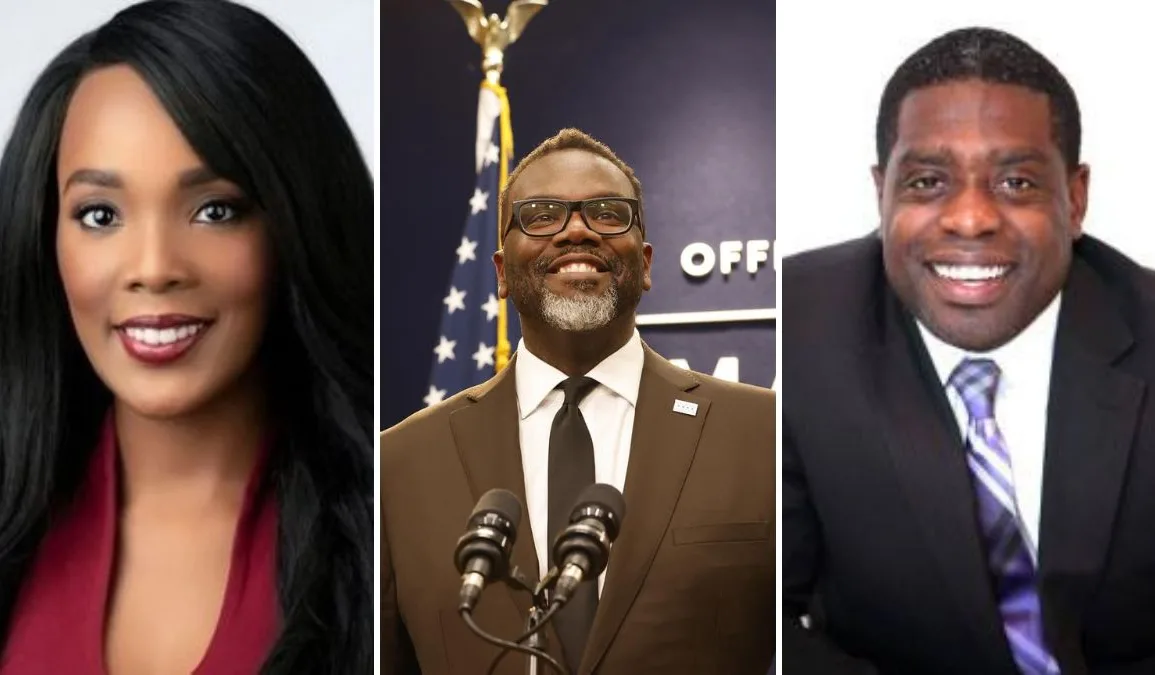
At the six-month mark of Brandon Johnson’s tenure as Chicago Mayor, the City Council approved his $16.6 billion budget with hardly any real opposition.
The fact that Johnson’s spending plan, approved by a 41-8 vote, allowed him to adhere to his critical promises on the campaign trail is a significant first victory for Chicago’s 57th mayor.
His budget, which goes into effect on Jan. 1, accomplishes the following:
- Bolsters mental health services on several fronts, including the city’s crisis response as part of his “treatment, not trauma” approach to public safety
- Allocates funds to help the formerly incarcerated find jobs and other assistance
- Expands the city’s youth jobs program
- Invests in environmental justice
- Provides for the formation of a committee to explore reparations for Black Chicagoans
- Earmarks grants for struggling homeowners looking to make repairs
He and his administration accomplished this and more while eliminating a projected $538 million shortfall and refraining from raising property taxes.
While the spending plan’s passage is a resounding win for Johnson, he still has to contend with the crisis of newly-arrived men, women and children from the southern border – a politically-manufactured event beyond his control that has brought approximately 24,000 people seeking asylum to the city. While his budget provides $150 million to support new arrivals, it isn’t enough, as Johnson has asked state and federal officials for financial help.
Moreover, how he handles this crisis will be heavily scrutinized, especially by members of the African-American community, who believe city leaders have prioritized the needs of the migrant community above their own.
Though it’s early, Mayor Johnson’s effectiveness in handling the new arrivals could determine the success of his tenure. While the passage of his first spending plan is notable, it’s an early chapter in a story yet to be completely written.
The Chicago Defender recently spoke with political analysts Ameshia Cross and Ted Williams III about how Mayor Johnson’s tenure is going so far.
Cross, a Chicago-born political commentator and democratic strategist for national, state and local campaigns, and Williams III, a performing artist, educator and Chairman of the Social Sciences Department at Kennedy-King College, talk about their impressions of Johnson’s campaign, his policies and the strides he’s made since his May 15 inauguration.
This article is Part 1 of our conversation. Stay tuned for Part 2.
General Impressions of Mayor Johnson’s Tenure as Mayor, Six Months In
Ameshia Cross: Looking at his strategy, not only in terms of running but also on the issues he was elevating things previous administrations did not, particularly around equity. That was one of his major policy areas: equity and affordable housing. Equity in budgeting, ensuring that all of Chicago was taken care of and not just the glistening parts of the downtown area. Equity in education that is focused on improving our public school system. In particular, students of color, students from low-income backgrounds and those from immigrant families having access to opportunity. It is very important to note his ideology on mental health. He came in putting a shining star on mental health and mental health issues and access, access that takes care of those who may be suffering.
We hear a lot of people talk about mental health. We don’t see a lot of public budgeting going towards it. And as announced in his most recent spending plan, mental health is something that he has put money where his mouth is. It’s not just rhetoric.
Within a very short amount of time, Mayor Johnson has been able to establish himself, not only in terms of a progressive vein but also in making sure his people are taken care of. And when I say his people, I mean the people of Chicago — the people who have had historic divestment. – Ameshia Cross
Ted Williams III: We have to be very careful about evaluating political leaders too quickly. Many of the challenges that we face, poverty, crime, homelessness, all those sorts of things, they’re generational problems. They are somewhat intractable. You won’t see a lot of movement on them. And so we live in a very short-sighted society, at times, a microwave culture. We’re looking for things to change immediately, which doesn’t happen that way. In politics, perception is reality. In terms of perception, he has a little bit of a way to go. In terms of actual, practical policy and movement, he has really made some significant strides.
Significant Strides Mayor Johnson Has Made
Williams III: When we talk about being a progressive mayor, he had large items in his campaign that people are looking to see happen. But there are a few significant promises that have moved forward.
He re-established a Department of Environment that was closed by Rahm Emanuel. When it comes to education, he extended the paid parental leave policy for CPS employees to 12 weeks, which lines them up with the city of Chicago employees, which was significant for CPS employees. He also has established a deputy mayor of labor relations. He established a deputy of homelessness position and a similar position to deal with the migrant crisis.
The “Bring Chicago Home” property tax transfer that will lower property taxes for everyone else but increase them for those who are buying properties that are over a million dollars. That money will go directly to fighting homelessness in the city, which I think is very important. There’s also this effort to commemorate, in a sad way, the legacy of Jon Burge. He has secured $6.8 million for the construction of this commemoration of the torturing of Black men in the city of Chicago. I think it is important to tell these stories.
Last but not least, I would say that this “treatment, not trauma initiative,” that he had promised has moved forward, so we can expand mental health services rather than just dealing with crime from the symptom perception.
Mayor Johnson’s Effectiveness in Addressing Public Safety
Cross: It’s tough in a city like Chicago, which is the “City of Broad Shoulders” but has also been known as the most segregated city in America. It has a lot of different cultures but also a lot of historical divestment, particularly in communities of color. The Black community has felt this the hardest. He walked into an administration with lofty goals, but he was never going to be a complete savior for the city.
I think that anyone who puts a spotlight on the Mayor’s Office as one that can, within one administration, be able to solve all of the historic and multi-generational problems as they relate to systemic racism and systemic inequality across the city, that’s a heavy cross to bear.
Within a very short amount of time, Mayor Johnson has been able to establish himself, not only in terms of a progressive vein but also in making sure his people are taken care of. And when I say his people, I mean the people of Chicago — the people who have had historic divestment.
I would argue that his passing the most progressive paid-time-off legislation the country has ever seen is huge. If you’re someone who has worked in a small business, or if you’re someone who was one of those essential workers, as we deemed them, during the pandemic, many of those people did not have time off. To be able to maintain that level of having that benefit matters. And for many people of color, specifically Black people who are working hard to keep our economy going every day, paid time off was something they could have only dreamed of. Being able to have that, at this stage, really matters.
These interviews have been edited and condensed for clarity.
The post Mayor Johnson at 6 Months: Political Analysts Talk His Wins and Challenges appeared first on Chicago Defender.
Post Views: 12



